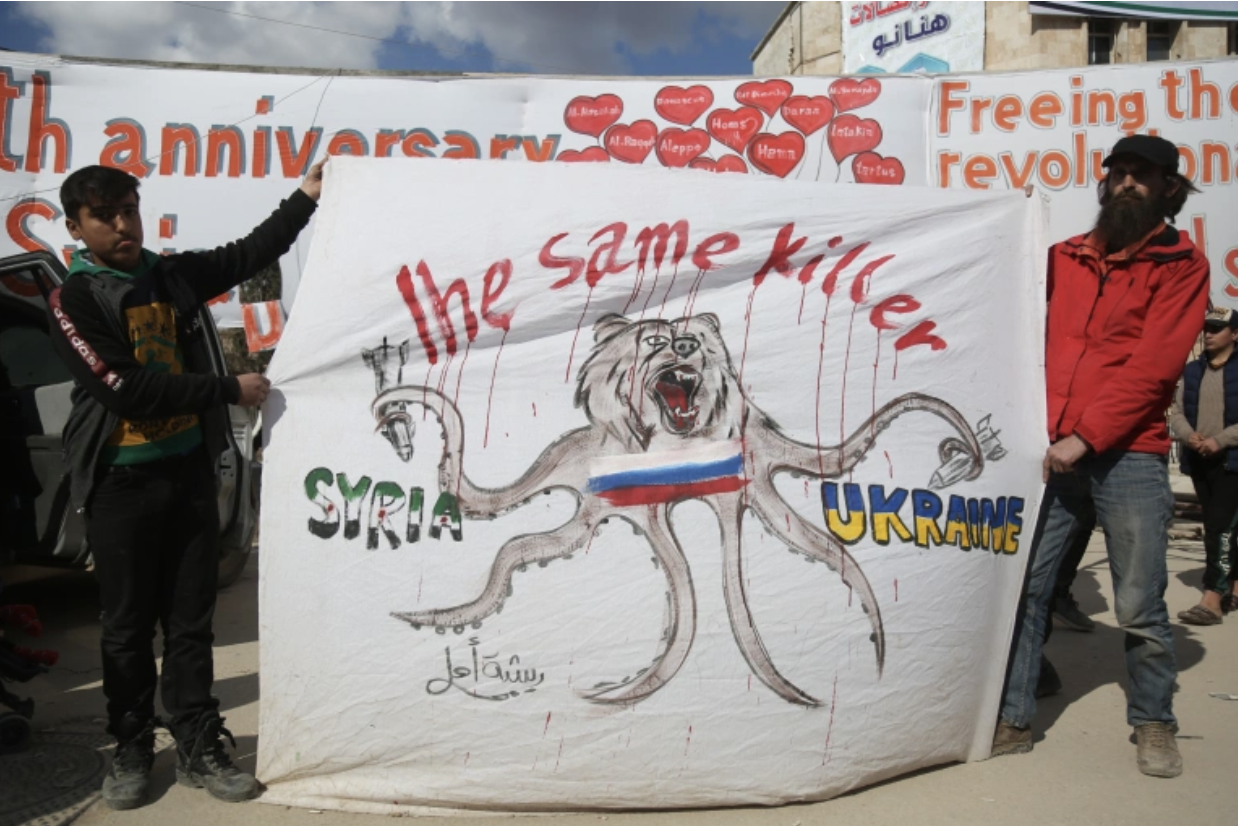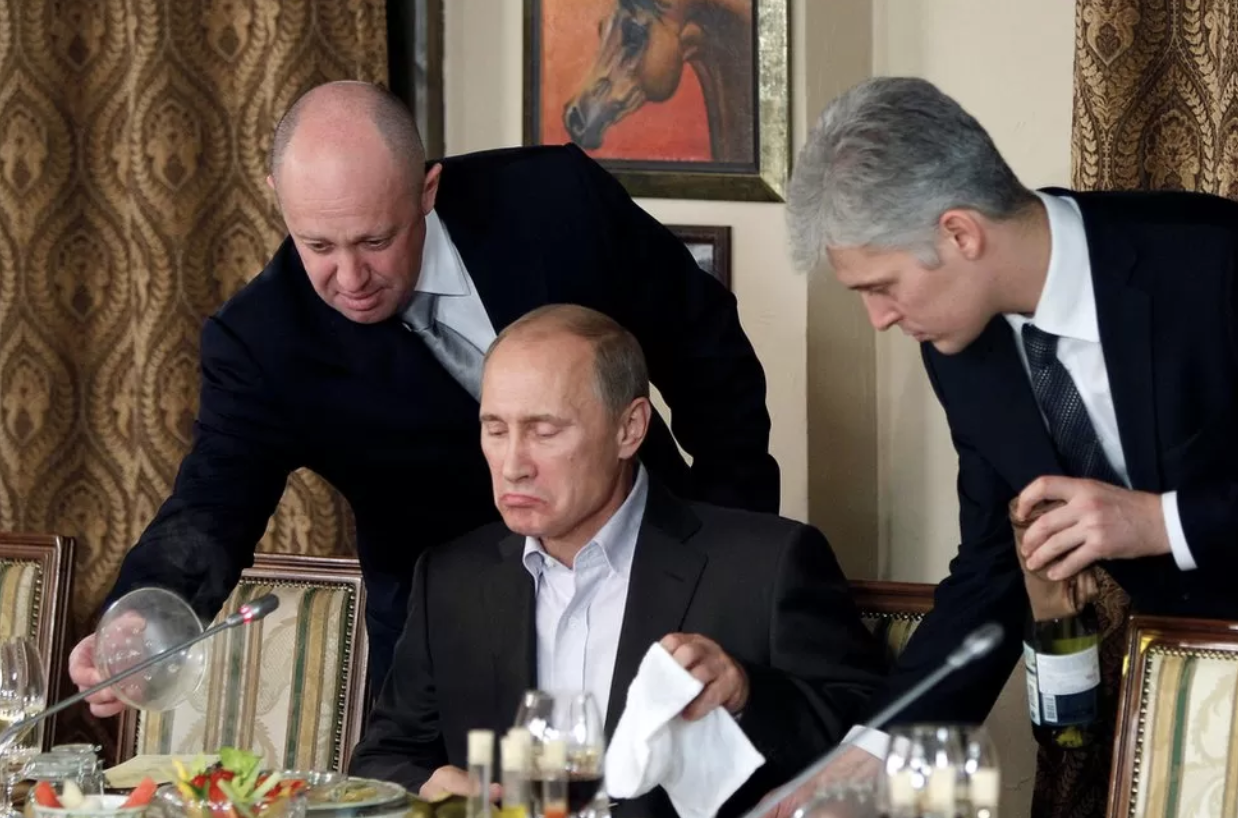Russian Oligarch Admits Ties to Wagner Group, Accused of War Crimes in Syria
A protest in Syria’s Idlib province in March of 2022 compares Russia’s bloody impact on Syria’s Civil War to its invasion of Ukraine this year. Photo: Ali Haj Suleiman for Al Jazeera
What do these five events have in common?
The 2017 torture and beheading of a captured Syrian Army deserter, recorded on video and shared on social media.
The suspected murders of three Russian journalists in the Central African Republic in 2018, where they were investigating the exploitation of conflict minerals.
The March 2022 massacre of 300 civilians by Malian Armed Forces and allies in the small Malian market town of Moura.
The creation of Facebook Pages and propaganda sites glorifying Russian mercenaries and supporting political candidates in Libya, Sudan, the CAR, and Mozambique, leading to their removal by Meta for foreign election interference.
The violent suppression of protests in Sudan and participation in gold smuggling in the country.
They all are among the alleged crimes of the Wagner Group, a Russian paramilitary contractor - long rumored to have ties to the Russian Defense Ministry - that has been operating in support of dictators and Russian companies in the Middle East and Africa since the mid-2010s.
The presence of Russian mercenaries first tied to a contractor known as the “Wagner Group” was first reported in Syria, specifically in the Palmyra region, in late 2015 by the Wall Street Journal.
Early rumors of Russian volunteers or "advisors'' assisting the Bashar Al-Assad regime leaked from the coastal province of Latakia, in Syria, in the fall of 2015, within a month of Russia beginning airstrikes in support of Assad.
Although private military companies are illegal in Russia, the group was reportedly contracted by the Russian Defense Ministry to defend Russian economic and security interests in Syria, in collaboration with Bashar Al-Assad’s government. It is likely that Wagner mercenaries engaged in direct conflict with US troops in the Battle of Khasham in 2018.
As recently as March 2022, the New York Times wrote that “unless you have been on the battlefield in Syria, Libya or the Central African Republic, you most likely have never heard of the Wagner Group, a private military force with close links to President Vladimir V. Putin of Russia.” The Wagner Group began to develop a public image only when the war in Ukraine led to greater discussion of the group’s activities in Russian-language media due to losses in the Donbas which required them to recruit more aggressively.
Less than a decade after the Kremlin had denied the fledgling Wagner Group's existence, a close associate of the Russian president admitted to founding and managing the group. As the war in Ukraine drags on, the prominence of this mercenary group in Eastern Europe, Africa, and the Middle East has only expanded.
Evgeny Prigozhin (left), the owner of the Russian paramilitary Wagner Group, pictured alongside Russian President Vladimir Putin in 2011. Photo: Reuters via BBC
Yevgeny V. Prigozhin, released a statement on September 26 admitting that he was the founder of the Wagner Group, the Russian-backed private military organization and “security firm” accused of supporting dictators throughout the Arab world and Africa. Prigozhin, a former Soviet-era convict from Saint Petersburg, owns a chain of catering businesses and restaurants known to cater banquets for the Kremlin, leading some in the Western press to dub him “Putin’s Chef.”
In 2018, Prigozhin was indicted by a Washington DC grand jury for interfering with the 2016 American Presidential Election. Speaking to the New York Times after the indictment, Russian opposition activist Lyubov Sobol described Prigozhin as a man “not afraid of dirty tasks… He can fulfill any task for Putin, ranging from fighting the opposition to sending mercenaries to Syria.”
Prigozhin’s admission of his association with the Wagner group comes after an increasingly intense recruiting campaign for the Wagner Group, carried out in Russia, parts of Africa, and Syria both before and alongside Russia’s recent draft.
In September, a video was leaked of Prigozhin at a prison in Mari El, reflecting the Russian state’s policy of recruiting and conscripting most heavily among ethnic minorities in remote territories of Russian imperial and colonial conquest.
Prigozhin told prisoners that "If you serve six months, you are free... nobody goes back behind bars," but "if you arrive in Ukraine and decide it's not for you, we will execute you." When the video was criticized - in part, due to the illegality of freeing prisoners in exchange for military or mercenary service in Russia - Prigozhin released a statement telling Russians that "It's either private military companies and prisoners [fighting in Ukraine], or your children - decide for yourself."
In March, a group calling itself the “ISIS Hunters,” with confirmed ties to Wagner members and a near identical insignia, began recruiting in Syria. The group called on men with military experience from the civil war and associated insurgencies to fight on the Russian side in Ukraine.
Prior to this, a spokesperson for the US Department of Defense said that “we have seen indications that the Wagner Group is recruiting in places like Syria and places like northern Africa, Libya” and “we have indications that… they plan to put a thousand or so of their contractors in Donbas [in Ukraine].”
In that manner, a former leader of the disbanded Russian-backed Desert Hawks Brigade began contacting former fighters to go to Ukraine at the start of the war, according to Al Jazeera. Moreover, Wagner and allied Syrians were recruited directly in Deir Ez-Zor province, offering salaries ranging from $200-$300 to over $1,000 a month, depending on military experience. At least some of these mercenaries were deployed to Ukraine by early April.
In the first few months after Russia’s invasion of Ukraine, many presciently compared the conduct and tactic of Russian troops to their actions in Syria a half-decade earlier. The spring siege of Mariupol had much in common strategically with the devastation wrought on Aleppo by Assad and his Russian allies in 2016, itself rooted in Russia’s almost total destruction of Grozny during the Chechen wars of the 1990s.
Bellingcat estimated in 2020 that at least 2,500 mercenaries from the Wagner group had been deployed in Syria. The number of Wagner mercenaries now in Ukraine is variably estimated at 1,000, 5,000, 8,000, or more. Unfortunately, the participation of the Wagner Group and other Kremlin-linked private military contractors is another tragedy that Ukrainians and Syrians now find they have in common.


